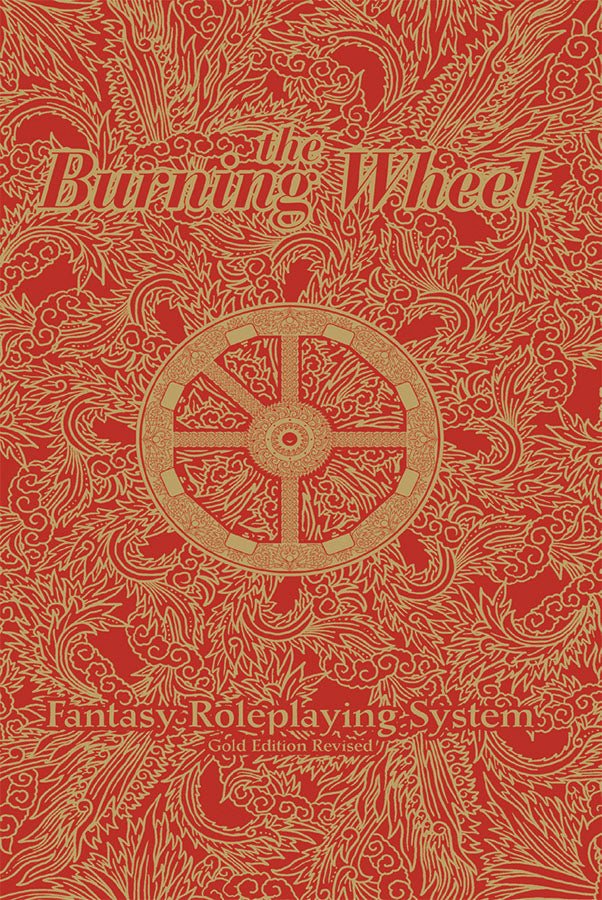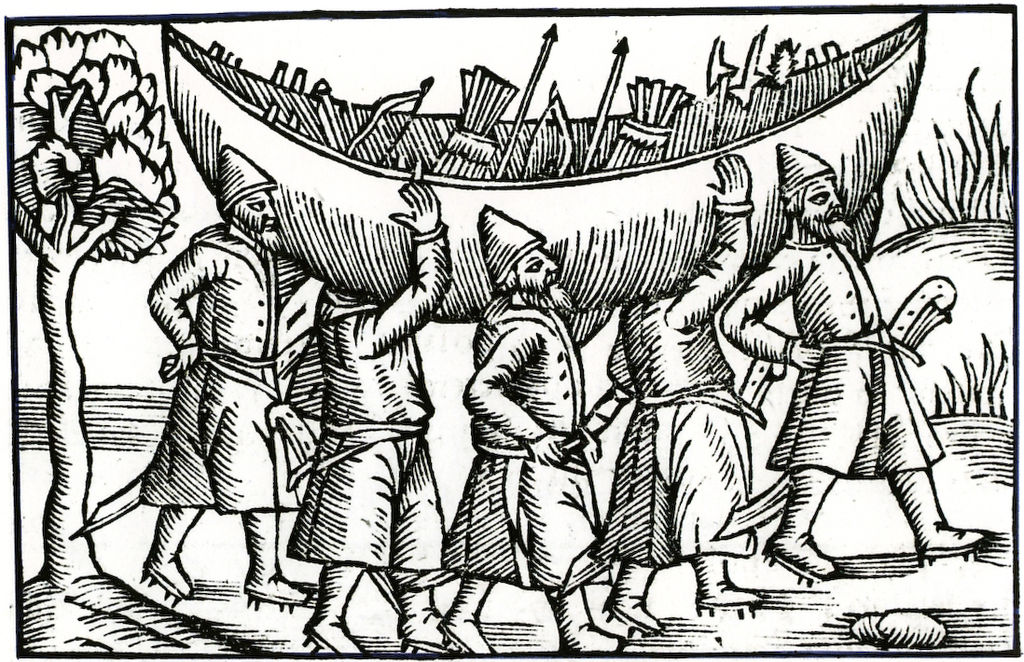So, one of my favourite stories about my play experience is how I ran “Burning Wheel” wrong for 50 sessions (counted, now I played something around 84 sessions of BW). From my and most players perspective it was quite normal and there wasn’t anything suspicious… and so it was until I ran it for Aleksandra for the first time. She is probably the most careful reader I play with and I wasn’t surprised that after our second session she told me “Wafer, you railroaded us”.

We meet to read the book together. She showed me the beginning of the manual and after further reading and discussion I gladly agreed to her point. I love when the game surprises me with subtle rules I don’t see at a first glance. Burning Wheel is unbeatable in this contest. I discover something new each time I play it.
To outline what was wrong: we played a alt-historical campaign in medieval Poland (13th century Pomerania). Players wanted to travel from small village near Malbork to Elbląg using their boat. They were our polish vikings, we call “chąśnicy” (sorry I don’t know how to pronounce it or if there is an english translation). Either way, I decided to establish a scene during their first night (they were traveling by the river, to avoid sailing near Malbork). The whole second session was about this unplanned stop and how our equivalent for Teutons wanted to catch part of our band.
And that’s where our play differed from the rules. At the time I didn’t realized it yet, but it had much in common with playing situations, as Ron use to call it. In “Burning Wheel” players declare their intents and how they plan to realize them (tasks), and if it’s not interesting we can skip it (ok, after a week you are at Elbląg) or if it’s something difficult or dramatic we can make a test for it (hmmm, its early spring and there is still ice in the rivers, let’s test your Sailing skill). If we decide for a test (or a serie of linked tests, what can happen) on failure I can complicate the situation however on a success (and that’s how it looked during our session) I should give the intent to the players. I was astonished how elegant it was and how much sense it makes to me! “Burning Wheel” doesn’t operate on scenes. It operates on intents. We are floating at a situation level. Players are declaring their intents and tasks, GM decides if it just happenes or if we roll for it, and then we timejump (BW has rules for practicing during free time, that fits into such model of play perfectly!) and check what happens next. We zoom-in into scenes, of course, but the main part of the game playes at situations level!
A year later, I think, we played “Steal Away Jordan” with Aleksandra and another player. It so happened that she ran two sessions and then I ran one. When she described the situation our slaves was in, she told us about slave-hunters arriving to our plantation, about how our work at sugarcane plantation looks like, about our overseer, whites and blacks within the hunters and asked as what we do. I tried to frame our overseer into helping a runaway slave, to take his place (my secret goal). I don’t recall what the second character declared but he also took an action toward his goal. It worked quite well.

During the session I ran, I moved the time forward and described a scene in which the runaway from the first sessions was about to be hanged. I described how our (now the other two players) characters were transported to see her execution as a reminder. It was hard framed scene with little to none character agency. Best they could do was describe their tears, looking away or trying to call spirits for help.
After the session we discussed how we ran the game in two very different ways and that was the moment, when I understood the difference between playing on Situations in opposition to playing on Scenes.
After this short campaign I had the context I needed to rewatch Ron’s “Situation at play” and fully understand it. It also showed me, how important was this practical, first-hand experience. Without it all theoretizing and discussion around Situations was somehow abstract and etherical. To grasp this concept I needed to play that two different sessions and reflect on them. I could see at that time, how for years of traditional play my main technique was hard framing and pushing characters from one scene to another and how easy it gets when we zoom out.
I’m still learning but “Burning Wheel” and “Steal Away Jordan” will forever be the games that taught me playing on Situations. And Aleksandra of course, as she became my mentor when it comes to satisfying play since 2020^^’


4 responses to “50 sessions played wrong”
You’re making a lot of sense, and I’m not sure I should add complications. Let me know whether the following point helps or causes problems.
The topic, as I see it, is control. What you’re calling hard framing and playing scenes has been, in your experience, a form of control, much like a showrunner for a TV series. “They are here, this is what they see, what do they do?” … with very little in question, because what they do is whatever the showrunner is cueing them to do or stopping them from doing. It is related to the notion of the GM as an entertainer.
I think what you’re saying about situational play is absolutely correct, and its positive feature is that this form of control is absent, even when the GM has a great deal of situational authority.
Here’s the hard point, and I fear that it may disperse the topic into more abstraction for you, although from my viewpoint it’s not abstract. … That one may still, as GM, implement hard cuts and even contexts which presuppose a certain amount of unseen activity between the scenes, without exerting this control. In other words, a hard or smash scene transition is merely a detail; the issue is whether the control factor is at work.
This may be a next step for you – once you have experienced a fair amount of non-control situational play, preferably both as player and as GM, then you may find yourself implementing hard cuts after all, perhaps only occasionally, without violating the situational power of play.
You may be interested in reviewing my perspective in Primetime Adventures, which I think is generally badly taught and frankly un-played … something else, a weird and broken thing, is being done instead. That something is very much like a writers’ room, in which people sit and chat about what this scene will have in it, and what conflict will occur, and what it will be about, and much other stupidity which is not actually in the procedures for scene transition at all. This horrible thing has somehow become associated, subculturally, not only with Primetime Adventures but with the word “scene,” ignoring that all fiction and all role-playing entails scenes, regardless of how we cut from one to the next, or whether we notice that we do so.
Yeah, I had this experience of writer’s room. I think I remember it mostly from “Blades in the Dark” with position negotiations or deciding which action to use (as if the fiction wasn’t enough!).
I like the rule from “Mouse Guard” about not weaseling your advantages upon fellow players or from “Burning Wheel” about not being a wet blanket 😀
I can see how hard framing can be used in a healthy way to drive the scene right to the main point.
As for “Primetime Adventures”, it’s on my list to play, and I’ve seen your videos about it being mutilated – just another reason to try it myself 😉 In my experience there isn’t that many people interested in learning the rules and treat them like an instruction. I believe PTA suffers from the analogy to writer’s room where, if I understand it correctly, it’s more like an actual camera shooting – no negotiations about “how the plot should be”, just trying to act it right now, as established by the director.
Either way, I will surely concentrate now on trying to run more situationally to build some good habits. To this day I remember running “Twilight in the Duchy Verdorben” for my old, more casual group and at one point I was so tired of doing all that “The GM” stuff – spotlight, description, rules – that it really make me all sweaty and relieved after the session had ended. Seeing how in engaged group, I can just sketch the situation and ask what they do is so much easier!
Your last sentence sings to me especially! Letting go is so much easier – you can lean back and actually enjoy the others’ contributions rather than immediately filtering them for possibly threatening your plot and planning how to counter them to keep things on track. And things develop into directions you never anticipated and that’s FUN!
From play experiences I like both Burning Wheel and Steal Away Jordan quite a bit, but I think you’re giving them too much credit for your insights here!
From what I see, what was important was that you played genuinely, wanting real play and wanting to get better at it, and paid attention to your play.
Of course the rules within your play probably provided a particular angle or way through your insight.